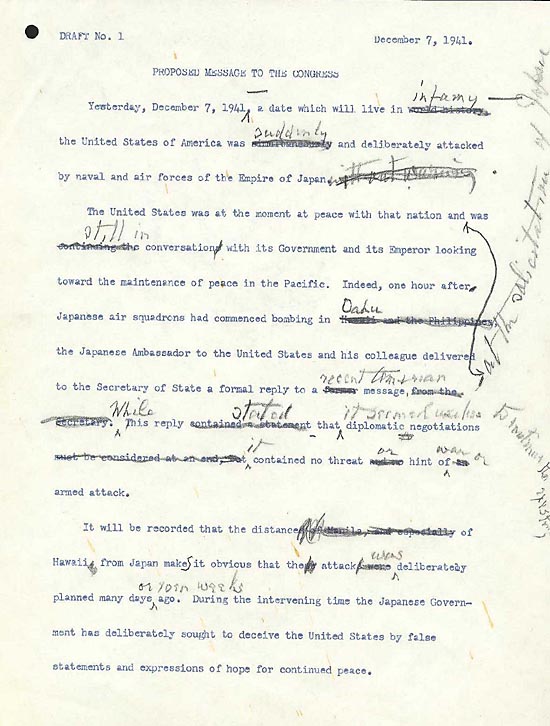Remembering a Speech – 80 Years Later
80 years ago today, Japan bombed Pearl Harbor, and tomorrow marks the 80th anniversary of one of the most significant orations in American history: Franklin D. Roosevelt’s Declaration of War Upon Japan. The speech is significant for several reasons.
It reminds us of the nation we once lived in. We hear the dignified tone of a great American leader, confident in his country, confident in his God. We are reminded that the President is a man under authority himself, as Roosevelt asks Congress to declare war rather than taking unilateral executive action.
It shows us that a great speech can be written at the simple level of style, using few rhetorical devices beyond the stately rhythm of its prose. This is not to say that the speech was not carefully composed. On the contrary, there is available the following marked-up copy of the speech, which shows Roosevelt’s edits:
We see, for example, that the original version of his introduction had “world history” rather than “infamy,” and “simultaneously” rather than “suddenly.” Roosevelt apparently changed those words to make the information more forceful.
Also, this speech exemplifies how to arrange arguments according to strength. FDR presents three main proofs in this order:
1) The United States was deliberately attacked by Japan, which bombed Pearl Harbor while speaking about peace.
2) The attack caused severe damage and cost many American lives.
3) Japan simultaneously launched an offensive against British and American bases throughout the Pacific.
As a matter of emphasis, of the approximately three hundred words in the proof, about half are used to corroborate the first point, one-sixth the second, and one-third the last. While the middle argument would cause sadness mixed with anger, the two arguments that bookend the proof are strongest in terms of justifying a declaration of war.
Take four minutes to watch a video of this slice of American history:
Fitting Words Classical Rhetoric covers this speech and many others as examples of historically powerful speeches.

Comments
As an editor, it is fascinating to see how Roosevelt used many standard editorial markings to change up this text. I don’t think most students today are taught how to do that. Excellent evaluation of this powerful speech.